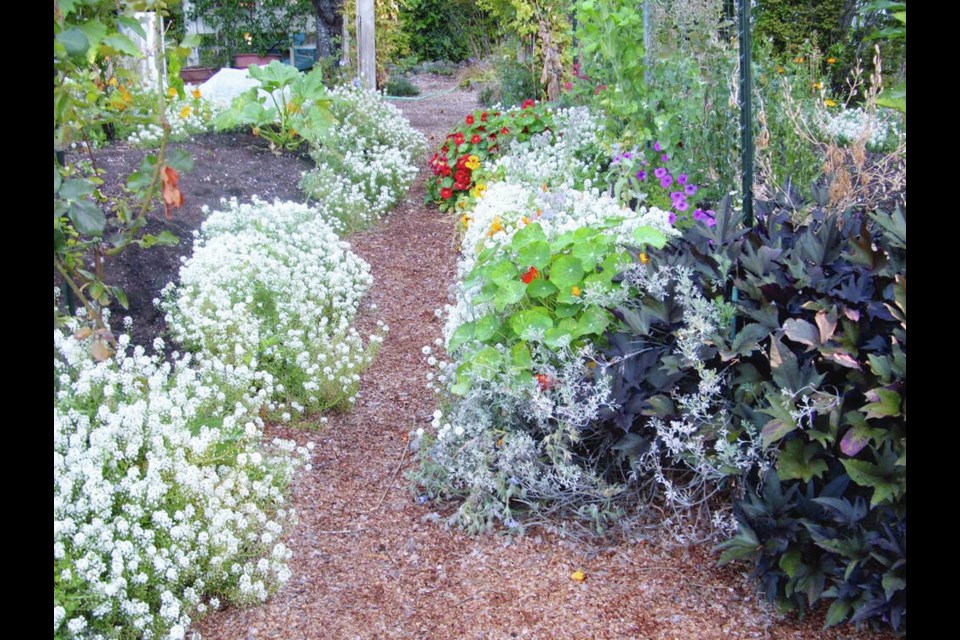Though last week did deliver a cold snap, February also brought the delights of sunny days in the garden.
On one of those days, I finished digging the last of the carrots, beets and leeks. Since then, almost every day I’ve been consuming shredded carrot tossed in equal amounts of fresh lemon juice and olive oil, with a few currants added. There’s a perpetual container in the fridge of steamed beets in a balsamic vinegar, olive oil, honey, garlic and cumin sauce.
The last of the leeks starred in a splendid leek and pea tart that was quickly made by cooking finely chopped leeks (about four cups) in butter, in a covered pot for 20 minutes, cooling the leeks slightly, adding frozen garden peas, and mixing in four eggs whisked together with one cup cream. The tart is baked at 375 F. for 25 minutes, or until the top is golden.
Over the past few years I’ve formed the habit of pre-baking pie shells for 12 minutes at 325 F. before filling them. It helps to keep the shell bases flaky.
I consider these quiche-like tarts a great way to use vegetables that are seasonally plentiful. Zucchini and onion feature in summer tarts, spinach and garlic in spring and early summer.
Now, with the garden’s kale in abundance and a hefty harvest of carrots on hand, the next tart I’m planning will have a shredded carrot and chopped kale filling.
I regard these vegetable tarts as all-purpose edibles. A warmed slice serves perfectly as breakfast. The tarts provide tasty snacks, warm or cold, and a generous slice with a robust salad or side vegetable makes as fine supper.
Let go. Save the world. On the Sunday before last week’s cold snap, sunshine lit up the vegetable plots as I trundled finished compost to the planting site for my first four-metre long, double row of shelling peas. That lovely afternoon, I took numerous breaks from the soil preparation to observe a horde of bees in a broad, thick carpet of crocuses edging the strawberries.
The bees’ low droning, along with their purposeful movement, was mesmerizing — gratifying too, knowing that this garden, tended without the use of chemically processed inputs over several decades, was a place of health and safety for these essential creatures.
Early the following morning, I listened to a radio interview with Oliver Milman, a Guardian journalist focussed on environmental issues. His book, to be published this spring, is titled The Insect Crisis: The Fall of the Tiny Empires That Run the World. The book cites current evidence that insects, which make up two-thirds of all life on earth, are suffering catastrophic losses, with potentially disastrous consequences for the survival of our own species.
Insects are an irreplaceable part of the natural word. They perform pollinating and many other ecological, life-sustaining services. One-third of the food we eat depends on insect pollinators. Their services, estimated to be worth $57 billion annually, are performed free. Their reward, too often, is to lose their habitats and to be poisoned.
The Insect Crisis is described as an examination of how “collapsing insect populations worldwide threaten everything from wild birds to the food on our plate.”
In the Milman interview on CBC radio, he pointed to monoculture food systems and pesticide use as ongoing practices that are major contributors to the loss of insects we rely on for our own survival.
When asked what individuals can do to help prevent further losses, he replied, “Let go.” Nurture insect life on a property by letting go of striving for a super-tidy, pristine landscape. Let the grass grow a bit instead of insisting on a perpetually manicured look. Leave some shelter for the creatures that help us survive. Cultivate at least a tolerance for a slightly wild look.
Those of us blessed with our own gardens or with community plots or containers for growing plants can contribute much to the nurturing of insect life. Let kale plants bloom in the spring. The flowers are a rich food supply for insects, as are parsley, dill and cilantro blooms.
Sweet alyssum, calendula, candytuft and signet marigolds (Tagetes tenuifolia) such as Lemon Gem and Tangerine Gem are more flowers that nourish bees and other beneficial insects. Plant them throughout the garden, and grow them along vegetable plot edges.
Orchid show and sale. The Central Vancouver Island Orchid Society (CVIOS) invites the public to their “Spring Treasures” Orchid Show and Sale Friday to Sunday, March 4 to 6, at Nanaimo North Town Centre, 4750 Rutherford Rd. in Nanaimo. Friday hours are 9:30 a.m. to 9 p.m. On Saturday, 10 a.m. to 6 p.m. and on Sunday 11 a.m. to 4 p.m. The event will feature American Orchid Society judging, a silent auction, B.C. vendors, and potting workshops on Saturday and Sunday by donation. Admission is free. COVID mask protocol will be in place. Further details at cvios.org or at 250-937-7143.



